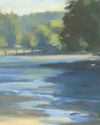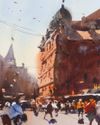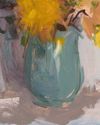
For acrylic and oil painters in particular, white is perhaps the most important pigment. While watercolourists will reserve the white of the paper for highlights, oil and acrylic artists use white extensively in most paintings, whether for lightening colours, creating more opaque qualities, or even greying down certain colours.
Ever since the first attempt to create a synthetic white pigment 2,600 years ago, experiments and discussions about the best formula for white still continue to this day. Getting the right white is important: nobody wants to paint a beautiful landscape, only to find the white sky has yellowed after only a few years.
When purchasing your white paint, you may be confused by the different names. A tube of “Flake White”, for instance, could contain a lead-based pigment PW1, or it could be a hue, mixed from Titanium and Zinc Whites. These pigments have completely different qualities, so it’s important to know what you are buying.
White from a tube usually consists of several things: the pigment, the solvent (for instance, oil when buying oil paints) and fillers added to improve consistency. As with all colours, “student grade” whites will usually have a higher solvent and filler content than “artists’ quality” paints.
Diese Geschichte stammt aus der September 2020-Ausgabe von Artists & Illustrators.
Starten Sie Ihre 7-tägige kostenlose Testversion von Magzter GOLD, um auf Tausende kuratierte Premium-Storys sowie über 8.000 Zeitschriften und Zeitungen zuzugreifen.
Bereits Abonnent ? Anmelden
Diese Geschichte stammt aus der September 2020-Ausgabe von Artists & Illustrators.
Starten Sie Ihre 7-tägige kostenlose Testversion von Magzter GOLD, um auf Tausende kuratierte Premium-Storys sowie über 8.000 Zeitschriften und Zeitungen zuzugreifen.
Bereits Abonnent? Anmelden

Still life IN 3 HOURS
Former BP Portrait Award runner-up FELICIA FORTE guides you through a simple, structured approach to painting alla prima that tackles dark, average and light colours in turn

Movement in composition
Through an analysis of three masterworks, landscape painter and noted author MITCHELL ALBALA shows how you can animate landscape composition with movement

Shane Berkery
The Irish-Japanese artist talks to REBECCA BRADBURY about the innovative concepts and original colour combinations he brings to his figurative oil paintings from his Dublin garden studio

The Working Artist
Something old, something new... Our columnist LAURA BOSWELL has expert advice for balancing fresh ideas with completing half-finished work

Washes AND GLAZES
Art Academy’s ROB PEPPER introduces an in-depth guide to incorporating various techniques into your next masterpiece. Artwork by STAN MILLER, CHRIS ROBINSON and MICHELE ILLING

Hands
LAURA SMITH continues her new four-part series, which encourages you to draw elements of old master paintings, and this month’s focus is on capturing hands

Vincent van Gogh
To celebrate The Courtauld’s forthcoming landmark display of the troubled Dutch master’s self-portraits, STEVE PILL looks at the stories behind 10 of the most dramatic works on display

BRING THE drama
Join international watercolour maestro ALVARO CASTAGNET in London’s West End to paint a dramatic street scene

Serena Rowe
The Scottish painter tells STEVE PILL why time is precious, why emotional responses to colour are useful, and how she finds focus every day with the help of her studio wall

Bill Jacklin
Chatting over Zoom as he recovers from appendicitis, the Royal Academician tells STEVE PILL about classic scrapes in New York and his recent experiments with illustration